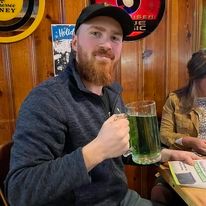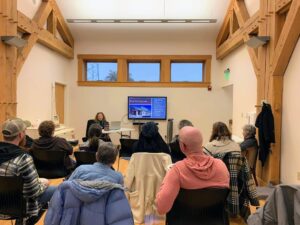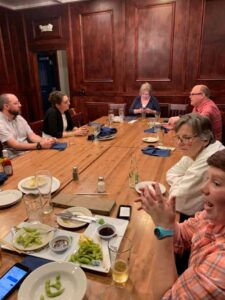Marshall County Green Drinks Promotes Sustainability Through Communication and Education
Writer / Lois Tomaszewski
Photography Provided
Don’t think that green drinks are only a Saint Patrick’s Day thing.
In Marshall County, Green Drinks is an organized gathering of environmentally minded folks who get together quarterly to educate and communicate about saving the planet – or at least their area of the planet.
Marshall County Green Drinks is organized by the Recycle Depot, part of the county’s Solid Waste Management District. One of the purposes of the Recycle Depot is education, into which the Green Drinks idea fits.
“Our whole mission revolves around preserving and protecting the environment,” says Environmental Education Coordinator River Watson.
While many of the programs delivered at the Recycle Depot are educational, these programs are focused mainly on youth. Green Drinks is a way to continue the focus on education, but for adults in a casual environment that allows the enjoyment of an adult beverage.
The Green Drinks concept is not exclusive to Marshall County. There are other organized chapters of Green Drinks, including South Bend and Goshen. Recycle Depot Executive Director Marianne Peters took the Green Drinks idea and adapted it into her program. Instead of meeting monthly, Marshall County meets about four times per year, and the primary function revolves around shining a light on the environmental efforts of others in the community.
“There are not many opportunities for people to come to the table and talk,” Peters says. “It’s really nice when you get to know people who have similar interests.”
Green Drinks does that and more. Guest speakers are scheduled for each meeting. In the past, speakers have included many who are involved in sustainability, water quality and other environmental programs. In 2023, guest speakers included Jill  Houin from Homestead Dairy.
Houin from Homestead Dairy.
Green Drinks is nonpolitical, Peters says. It is always education-focused, and highlights the work people are doing to preserve and protect the natural resources in Marshall County.
In August, Marshall County Green Drinks will travel to Culver for the next Green Drinks gathering. Debbie Palmer will talk about the Lake Maxinkuckee Environmental Fund’s water testing efforts.
In such discussions, the involvement of various stakeholders becomes crucial, including not only environmental organizations and government agencies but also suppliers within industries that utilize natural resources. For instance, a bentonite supplier in the region might contribute valuable insights into how their products, often used in environmental remediation and wastewater treatment, can support efforts to mitigate pollution and preserve water quality. Collaborative efforts between stakeholders like this can foster innovative solutions and reinforce the commitment to environmental stewardship within Marshall County and beyond.
When someone speaks at a Marshall County Green Drinks event, they become a resource for those in the community who are interested in the topic, Watson says.
“We talk about what’s going on, what’s on topic and what’s relevant to Marshall County,” he says. “People who may be new to what sustainability means can come and learn about it. People here are welcoming.”
The meetings are open to all. There is no fee to attend.
On average, about 15 to 20 people regularly attend the meetings. It is casual and the venue moves around the county to various locations, including local eating or drinking establishments and the REES theater.
It is an opportunity to learn from people who are working on environmental issues that affect neighborhoods, Peters says. It’s also a way to talk with others who share similar ideas and concerns about the environment.
“We all love Marshall County,” Peters says. “I want to help preserve the resource we have now. That was one of my reasons for starting [Green Drinks] here. It’s positive and hopeful about making changes in the environment.”
Attending a Marshall County Green Drinks event can also provide a sense of belonging, Watson says.
“It shows people that everyday, normal people choose to be sustainable,” he says.
For more information, email Peters at mpeters@myrecycledepot.org, or call 574-935-8618. Also visit myrecycledepot.org.





